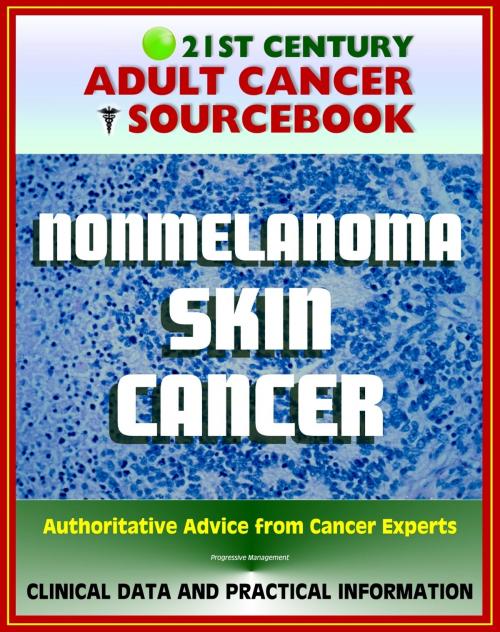21st Century Adult Cancer Sourcebook: Nonmelanoma Skin Cancer - Squamous Cell Carcinoma and Basal Cell Carcinoma (BCC and SCC) - Clinical Data for Patients, Families, and Physicians
Nonfiction, Health & Well Being, Health, Ailments & Diseases, Cancer| Author: | Progressive Management | ISBN: | 9781465737403 |
| Publisher: | Progressive Management | Publication: | October 28, 2011 |
| Imprint: | Smashwords Edition | Language: | English |
| Author: | Progressive Management |
| ISBN: | 9781465737403 |
| Publisher: | Progressive Management |
| Publication: | October 28, 2011 |
| Imprint: | Smashwords Edition |
| Language: | English |
Authoritative information and practical advice from the nation's cancer experts about nonmelanoma skin cancer includes official medical data on signs, symptoms, early detection, diagnostic testing, risk factors and prevention, treatment options, surgery, radiation, drugs, chemotherapy, staging, biology, prognosis, and survival, with a complete glossary of technical medical terms and current references.
Starting with the basics, and advancing to detailed patient-oriented and physician-quality information, this comprehensive in-depth compilation gives empowered patients, families, caregivers, nurses, and physicians the knowledge they need to understand the diagnosis and treatment of nonmelanoma skin cancer.
Comprehensive data on clinical trials is included - with information on intervention, sponsor, gender, age group, trial phase, number of enrolled patients, funding source, study type, study design, NCT identification number and other IDs, first received date, start date, completion date, primary completion date, last updated date, last verified date, associated acronym, and outcome measures.
Skin cancer is a disease in which malignant (cancer) cells form in the tissues of the skin. The skin is the body’s largest organ. It protects against heat, sunlight, injury, and infection. Skin also helps control body temperature and stores water, fat, and vitamin D. The skin has several layers, but the two main layers are the epidermis (upper or outer layer) and the dermis (lower or inner layer). Skin cancer begins in the epidermis, which is made up of 3 kinds of cells:
* Squamous cells: Thin, flat cells that form the top layer of the epidermis.
* Basal cells: Round cells under the squamous cells.
* Melanocytes: Found in the lower part of the epidermis, these cells make melanin, the pigment that gives skin its natural color. When skin is exposed to the sun, melanocytes make more pigment, causing the skin to darken.
Skin cancer can occur anywhere on the body, but it is most common in skin that is often exposed to sunlight, such as the face, neck, hands, and arms. There are several types of cancer that start in the skin. The most common types are basal cell carcinoma and squamous cell carcinoma, which are nonmelanoma skin cancers. Actinic keratosis is a skin condition that sometimes develops into squamous cell carcinoma.
Skin color and exposure to sunlight can affect the risk of developing nonmelanoma skin cancer and actinic keratosis. Risk factors for basal cell carcinoma and squamous cell carcinoma include the following:
* Being exposed to natural sunlight or artificial sunlight (such as from tanning beds) over long periods of time. * Having a fair complexion, which includes the following: * Fair skin that freckles and burns easily, does not tan, or tans poorly. * Blue or green or other light-colored eyes. * Red or blond hair.
* Having actinic keratosis. * Past treatment with radiation. * Having a weakened immune system. * Being male.
Extensive supplements, with chapters gathered from our Cancer Toolkit series and other reports, cover a broad range of cancer topics useful to cancer patients. This edition includes our exclusive Guide to Leading Medical Websites with updated links to 81 of the best sites for medical information, which let you quickly check for updates from the government and the best commercial portals, news sites, reference/textbook/non-commercial portals, and health organizations. Supplemental coverage includes:
Levels of Evidence for Cancer Treatment Studies
Glossary of Clinical Trial Terms
Clinical Trials Background Information and In-Depth Program
Clinical Trials at NIH
How To Find A Cancer Treatment Trial: A Ten-Step Guide
Taking Part in Cancer Treatment Research Studies
Access to Investigational Drugs
Authoritative information and practical advice from the nation's cancer experts about nonmelanoma skin cancer includes official medical data on signs, symptoms, early detection, diagnostic testing, risk factors and prevention, treatment options, surgery, radiation, drugs, chemotherapy, staging, biology, prognosis, and survival, with a complete glossary of technical medical terms and current references.
Starting with the basics, and advancing to detailed patient-oriented and physician-quality information, this comprehensive in-depth compilation gives empowered patients, families, caregivers, nurses, and physicians the knowledge they need to understand the diagnosis and treatment of nonmelanoma skin cancer.
Comprehensive data on clinical trials is included - with information on intervention, sponsor, gender, age group, trial phase, number of enrolled patients, funding source, study type, study design, NCT identification number and other IDs, first received date, start date, completion date, primary completion date, last updated date, last verified date, associated acronym, and outcome measures.
Skin cancer is a disease in which malignant (cancer) cells form in the tissues of the skin. The skin is the body’s largest organ. It protects against heat, sunlight, injury, and infection. Skin also helps control body temperature and stores water, fat, and vitamin D. The skin has several layers, but the two main layers are the epidermis (upper or outer layer) and the dermis (lower or inner layer). Skin cancer begins in the epidermis, which is made up of 3 kinds of cells:
* Squamous cells: Thin, flat cells that form the top layer of the epidermis.
* Basal cells: Round cells under the squamous cells.
* Melanocytes: Found in the lower part of the epidermis, these cells make melanin, the pigment that gives skin its natural color. When skin is exposed to the sun, melanocytes make more pigment, causing the skin to darken.
Skin cancer can occur anywhere on the body, but it is most common in skin that is often exposed to sunlight, such as the face, neck, hands, and arms. There are several types of cancer that start in the skin. The most common types are basal cell carcinoma and squamous cell carcinoma, which are nonmelanoma skin cancers. Actinic keratosis is a skin condition that sometimes develops into squamous cell carcinoma.
Skin color and exposure to sunlight can affect the risk of developing nonmelanoma skin cancer and actinic keratosis. Risk factors for basal cell carcinoma and squamous cell carcinoma include the following:
* Being exposed to natural sunlight or artificial sunlight (such as from tanning beds) over long periods of time. * Having a fair complexion, which includes the following: * Fair skin that freckles and burns easily, does not tan, or tans poorly. * Blue or green or other light-colored eyes. * Red or blond hair.
* Having actinic keratosis. * Past treatment with radiation. * Having a weakened immune system. * Being male.
Extensive supplements, with chapters gathered from our Cancer Toolkit series and other reports, cover a broad range of cancer topics useful to cancer patients. This edition includes our exclusive Guide to Leading Medical Websites with updated links to 81 of the best sites for medical information, which let you quickly check for updates from the government and the best commercial portals, news sites, reference/textbook/non-commercial portals, and health organizations. Supplemental coverage includes:
Levels of Evidence for Cancer Treatment Studies
Glossary of Clinical Trial Terms
Clinical Trials Background Information and In-Depth Program
Clinical Trials at NIH
How To Find A Cancer Treatment Trial: A Ten-Step Guide
Taking Part in Cancer Treatment Research Studies
Access to Investigational Drugs















